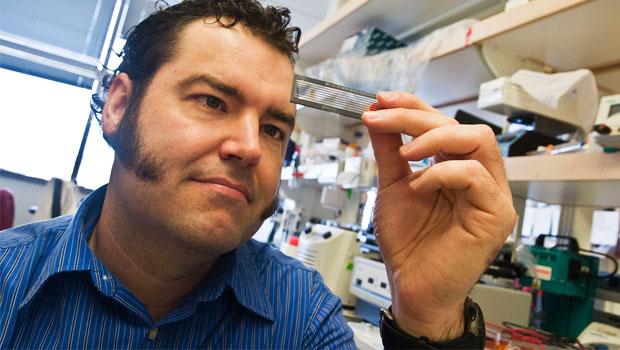Fresno State alumnus Dr. Brian O’Roak, part of the university’s inaugural Smittcamp Family Honors College class, is on a University of Washington genomic research team making headlines for a promising discovery that specific gene mutations increase chances of autism in children.
The data indicate that the risk of a child becoming autistic increases the older parents are and especially if the father is older than 35.
O’Roak was awarded a Bachelor of Science in Biology (Molecular, Cellular and Developmental Biology emphasis) from Fresno State in 2003 and also was the College of Science and Mathematics Dean’s Medalist.
After receiving his doctorate in genetics at Yale University in 2009, O’Roak joined the Eichler and Shendure laboratories with the University of Washington’s Department of Genome Sciences as a postdoctoral fellow.
The Eichler and Shendure lab in Seattle is one of three research teams cited in media accounts of this scientific breakthrough, reported during April’s National Autism Month, which calls attention to the need for research, prevention and treatment.
O’Roak feels fortunate to have been an inaugural member of the Smittcamp Family Honors College. “Being part of this new group of high-achieving students with access to the best faculty and the honors curriculum was tremendous,” he said. “I believe this level of undergraduate education would stack up well against any ‘top tier’ university.”
The Smittcamp Family Honors College is designed to provide high-achieving high school students a rigorous, enhanced academic, leadership and service experience at Fresno State, supporting Presidential Scholars with four-year scholarships.
“As a pioneering member of the Smittcamp Family Honors College, Brian set the bar very high for future President’s Scholars,” said Dr. Honora Chapman, a professor of Modern and Classical Languages and Literature who is director of the Honors College.
“His scientific achievements, founded on his excellent education at Fresno State and Yale, not only offer vital information about autism but they also inspire our present and future scholars to pursue their careers with the confidence that they, too, can make serious contributions to society. The Honors College is extremely proud to have him as an alumnus,” added Chapman.
Dr. Stephen Rodemeyer, an emeritus professor of chemistry and the former Honors College director, said O’Roak “was extremely active in the Honors College, completing several community service projects, as a reader of prospective student applications, and working on an upper-division honors program in the College of Science and Mathematics.”
Rodemeyer described O’Roak a star student who “did exceptionally well in both his major and honors classes, showing his overall quality. He was not a one-dimensional student; rather, he was able to relate across disciplines.” Rodemeyer said
O’Roak was the first in his family to be a university student and participated in the Ronald E. McNair Scholars Program, which guides students transitioning from undergraduate to doctoral studies. O’Roak said, the McNair Program “helped me through the entire process and provided opportunities for scientific research under a faculty mentor” at Fresno State before he enrolled at Yale.
He credits Dr. Alejandro Calderon-Urrea, a biology professor, as the “most influential of many excellent instructors at Fresno State.” O’Roak said, “I worked in Alejandro’s lab for the better part of three years, learning the ins and outs of the scientific method. Having a mentor who was a Yale alumnus emboldened me to take a chance to apply there myself.”
The greatest lesson O’Roak learned from his mentor? “That being a scientist is a lifelong commitment and not to be entered into lightly,” O’Roak answered. “You have to be prepared for the failures more than the successes. If research were easy it would simply be called ‘search.’ ”
Calderon-Urrea said, “I consider Brian one of the best students I have had the pleasure to work with during my 15 years at Fresno State. Since we met, our relationship has evolved: we were first mentor-mentee, and then we became friends and colleagues. And I am very proud of this relationship.”
When O’Roak received his doctorate from Yale, Calderon-Urrea wrote to his mentee remembering a research project at Fresno State.
“Although we didn’t get what we wanted out of the project, we certainly learned a great deal of things,” wrote Calderon-Urrea. “For one, we learned that there is a big difference between what you can imagine as a project and what you can do with what you have for tools. I am sure this was an important experience to keep in mind during your Ph.D. journey.”
At Fresno State, O’Roak maintained a 4.0 grade point average, minored in mathematics and “received nearly every research award available for undergraduates and several intended for graduate students as well,” read his Dean’s Medalist citation.
He was elected a student senator and led Smittcamp College peers in community service to Stone Soup, Children’s Hospital Central California and other organizations. He was co-founder and president of the Fresno State Brain Trust, captain of the university’s College Bowl team and president of the Catholic Students Association.
At Yale, he began working on human genetics under Dr. Matthew State, whose “enthusiasm for tackling the numerous challenges in psychiatric genetics led me on the path I’m on today,” said O’Roak.
In the immediate future, said O’Roak, his team is “working on developing new technology that will allow for sequencing many genes in thousands of individuals for less than $10 a person. We envision this having wide ranging impacts in both basic research and clinical testing.”
O’Roak gets great satisfaction from his genetic research work – a course he charted initially at Fresno State. He said, “It is nice to know at the end of the day that your work could have a major impact on people’s lives.”
Related links:
- New York Times story: http://www.nytimes.com/2012/04/05/health/research/scientists-link-rare-gene-mutations-to-heightened-risk-of-autism.html
- Smittcamp Family Honors College
- O’Roak bio





